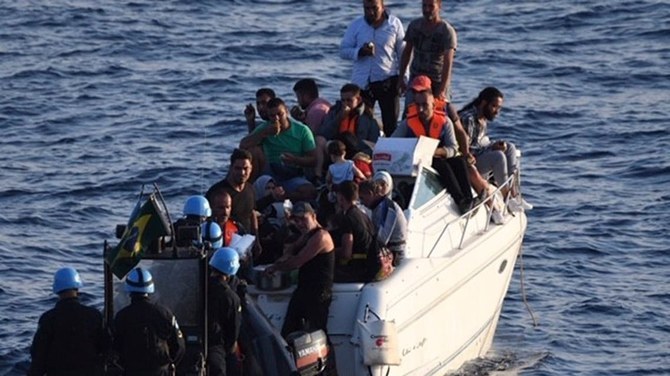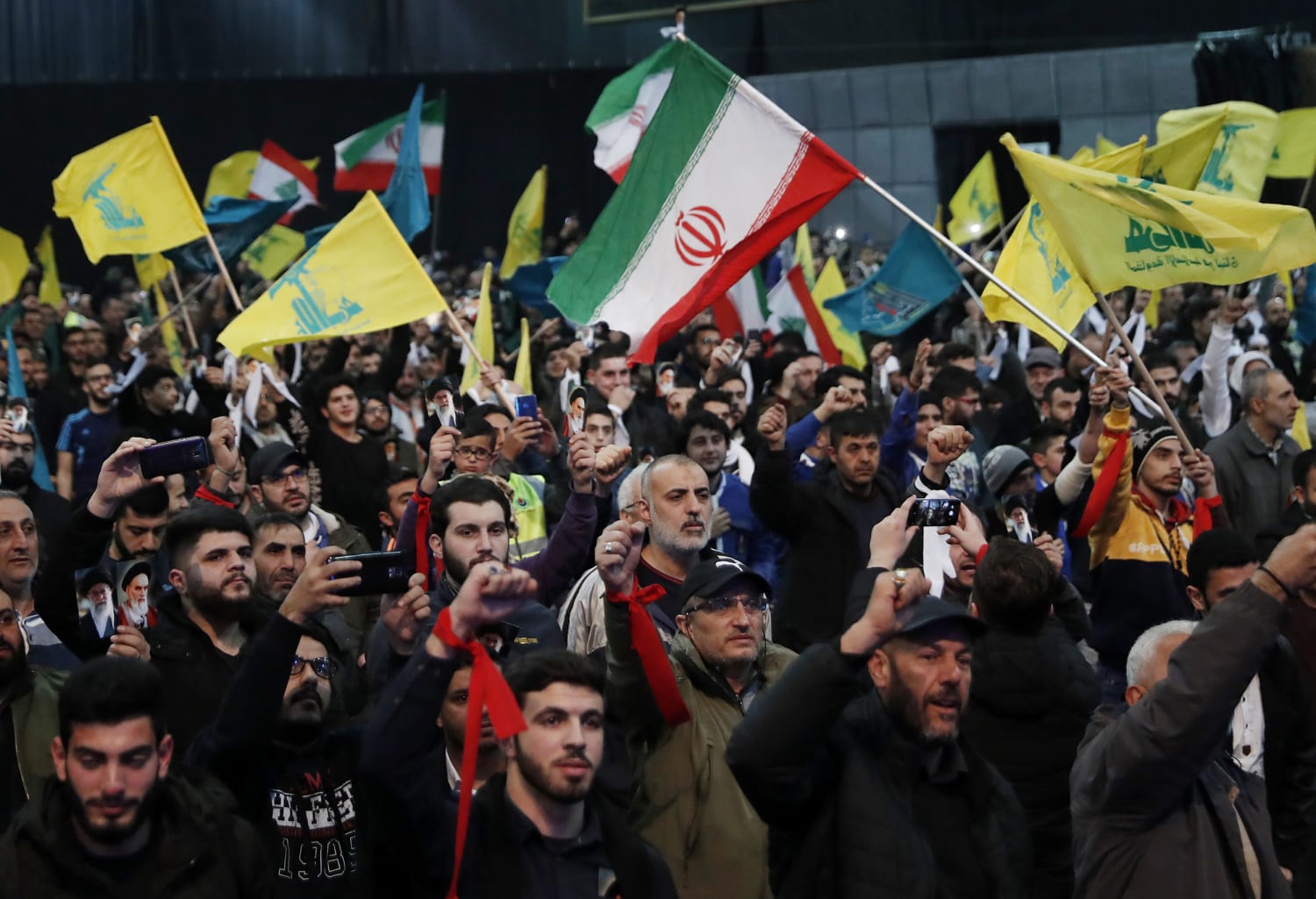by al-monitor.com — Russia sent satellite images of the Beirut port explosion to Lebanon today, Russian Foreign Minister Sergey Lavrov said at a press conference. Speaking to reporters alongside his Lebanese counterpart Abdallah Bouhabib in Moscow, Lavrov said Russia’s space agency Roscosmos provided the imagery to Lebanon, Reuters reported. The Beirut port explosion took place […]
by alarabiya.net — US Secretary of State Antony Blinken on Monday sent his greetings to the “people of Lebanon” on their Independence Day, stopping short of making any mention of the Lebanese government. Lebanese politicians and officials have been at the fore of domestic and international criticism since the country was thrown into an unprecedented […]
نعم لاقتراح وائل بو فاعور على رئيس الجمهورية الدعوة الى حوار وطني لمناقشة الاستراتيجية الدفاعية وادوار حزب الله في الخارج. المصداقية تقتضي ان يتضمن جدول الاعمال المتابعة من حيث وصل الحوار السابق. اي وضع الاجراءات التنفيذية لتحييد لبنان وفقاً لاعلان بعبدا ووضع جدول زمني للتخلي عن السلاح لا يتجاوز السنة يكون خلالها قرار السلم والحرب […]

by middleeast.in-24.com — Contrary to the victory achieved by the October 17 uprising against the political parties with the victory of lawyer Melhem Khalaf two years ago, associations affiliated with the “Revolution” banner, led by the National Bloc and “Our Syndicate” were unable to retain the position. From the transfer of its most prominent candidate, Ramzi Heikal, to the membership center with other candidates due to the dispersion of votes over more than one candidate, and due to the presence of strong candidates who attracted votes before the polling process ended with the election of the independent candidate Nader Kaspar, who won 1,888 votes in the first round and 1,530 votes in the second round.
Immediately after his election, Kaspar addressed the lawyers by saying, “I knew very well that you would not let me down, and my door would remain open to all of you, and I would take care of the lawyer’s immunity and the lawyer’s money and dignity as a red line, and we would not neglect national affairs with courage, wisdom and transparency.” Kaspar was subjected to a series of rumors in the past few days to influence his election campaign and say that he is supported by this or that party in power, but he was responding by asserting his independence even on election day. He called the lawyers to judge their conscience, and he was famous for telling the lawyers, “It is not because of two hours that we regret two years.” The election process was not spared the confusion among lawyers after the polls closed for the first round, while lawyers are still waiting for their turn to vote in polling stations 5 and 6, which prompted the former captain to request the reopening of the boxes for white card holders who are waiting for their turn to vote.
Imad Martinos (the opposition front), Nader Kaspar, Elias Bazerli, Abdo Lahoud (supported by the Lebanese Forces), Iskandar Najjar (independent supported by the Kataeb Party and the Opposition Front), Fadi Al-Masry (the Brigades), and Marwan won membership in the Beirut Bar Association Council. Jabr, Wajih Massad and Maya Al-Zaghrini (the candidate of the forces), and Fadi Barakat, the first loser, and he is supported by the Free Patriotic Movement, as it won 1010 votes.
أرتشِفُ قهوتي الصباحية، اللبنانية ( لا التركية )، في هذا الأحد المبارك وعينايَ تَرصُدان من نافذة منزلي في اليرزة، باقة أعلام ورايات وطنية تزدان بها الجادة المؤدّية إلى قيادة الجيش عشيّة عيد الاستقلال، ودار في مخيّلتي شريط ذاكِرة العقود السبع، سنوات بعزّها وأمجادها بخيرها وازدهارها وكذلك بحروبها ومآسيها، فلم أجد فيها أقسى وأمرّ وأصعب من […]

By Kareem Chehayeb – Al Jazeera – Beirut, Lebanon – Before mass protests against Lebanon’s ruling elite swept the country in October 2019, Yasmin Saad never thought she would be particularly invested in her home country’s politics. But two years later, watching from France a number of compounding crises battering millions of Lebanese, the 22-year-old marketing student decided to register to vote in next year’s parliamentary election. “I feel it’s a last chance – or a last hope,” Saad told Al Jazeera from Marseille. “What really, really pushed me to start voting was those days when everyone was protesting on the street – and we had protests and gatherings of our own in France.” She is not alone. More than 210,000 Lebanese living abroad have met Saturday’s deadline and registered to cast ballots in the March 27 election – more than double the number of expats who signed up for the previous polls in 2018.
Millions of Lebanese have left the country over the past decades, taking their skills and talents abroad to seek better opportunities in the face of instability, entrenched corruption and financial mismanagement. Though there are no clear numbers, many estimates claim that more live abroad than within the tiny country itself, home to some 6.5 million people, including Lebanese and refugees. Lebanese abroad were allowed to vote for the first time in 2018 under a new electoral law that also stipulated that six new seats would be added to the parliament in the 2022 election to represent the diaspora. However, independent political parties and many expats disagreed with the addition, arguing this was a way to isolate the diaspora from the local constituencies. Last month, MPs rejected adding those six seats, which means expats will vote in May for the existing 128 seats.

BEIRUT By AP — Lebanon’s navy rescued a boat carrying migrants that had left the country, heading west across the Mediterranean Sea, but broke down off the coast, the prime minister’s office said Saturday. It was the latest case of desperate people — mostly Lebanese, Syrians and Palestinians — sailing toward European Union member Cyprus, and sometimes Turkey, seeking to escape Lebanon’s worsening economic meltdown. Some 75% of the country’s population of 6 million, including more than a million Syrian refugees, now lives in poverty.
Prime Minister Najib Mikati’s office said the migrants had left Lebanon illegally, and that the navy towed the boat shoreward. It did not say how many migrants were aboard but said some were children. The statement added that there would be an investigation. Smugglers in Lebanon have made a business out of selling passage to Europe for thousands of dollars per per person. Upon their arrival at the coast, the migrants were detained and questioned by Lebanese authorities, the state-run National News Agency said. It said the migrants were in the dozens. On Saturday evening, relatives of the migrants protested, closing off three major roads, including the street leading to the port in the northern city of Tripoli demanding their release, the news agency reported. On Friday, the Internal Security Forces stormed a beach resort in the northern town of Qalamoun, where they foiled an attempt to smuggle 82 men, women and children to Europe. Police said that passengers had paid $5,000 per person, and that they had detained one of the smugglers.
العلم اللبناني رمز عزتنا وكرامتنا. وحده يجب ان يرفع دون اي علم آخر او راية او بيرق وتذود عنه بندقية الجيش. حيث يرفرف يكون العيد . هكذا احتفل به الجنوب في اللبونة عام ٢٠٠٦ بعد غياب اكثر من عقدين من الزمن بغية تحقيق استقلالية القضاء وابعاد تهديد السلاح غير الشرعي عن احكام القضاة على […]

by brookings.edu — Lebanese Hezbollah’s role as an Iranian proxy and its provision of significant assistance to its allies in Syria, Yemen, and Iraq has been an area of justified focus for policymakers in many capitals but the organization’s evolving role inside Lebanon merits equal attention. While it is customary to characterize Hezbollah as a “state within a state,” it is more accurate now to define it as a “state within a non-state,” in view of the sheer inability of the Lebanese government to deliver even the most basic services to a desperate population plunged into its worst economic crisis in over a century. In the past, Hezbollah was able to distinguish itself from Lebanon’s ruling circles, capitalizing on its nonstate status and role as the “resistance” to Israel. However, in recent years, Hezbollah has become ever more entangled with the country’s kleptocratic ruling elites and status quo defenders, an association that has alienated many of their compatriots. It is this mutation in Hezbollah’s role which poses risks for the organization and opportunities to support efforts aimed at bolstering institution building and the return of the state as well as the injection into Lebanese politics of more independent and technocratic individuals via national elections organized for the spring of next year.
Iran’s investment in Hezbollah proved successful for many years after Tehran, with the assistance of Damascus, oversaw the establishment of the organization in 1982. It was exempted from the Taif arrangements in 1989 which forced the demobilization of Lebanon’s other sectarian militias and therefore benefited greatly from this “last man standing” status. Hezbollah served a useful purpose as the tip of the Iranian spear in the Levant against Israel, with its most celebrated achievement being the Israeli withdrawal from southern Lebanon in 2000, for which Hezbollah took full credit. Lebanese citizens and many in the Arab world rallied around Hezbollah during its destructive 2006 war with Israel. From that time until today, the south has remained relatively quiet, with an uneasy unofficial truce established between Israel and Hezbollah.
By FRANCESCO BONGARRÀ — arabnews.com — ROME: Lebanese Prime Minister Najib Mikati will visit the Vatican on Wednesday to meet the Pope, the Ambassador of Lebanon to the Vatican, Dr. Farid Elias el Khazen, has announced. In an interview with the Italian newsagency Nova the diplomat said that Mikati’s visit “is necessary to discuss both […]



